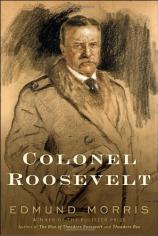Colonel Roosevelt
Review
Colonel Roosevelt
“I am like Peary at the North Pole,” says former president Theodore Roosevelt early on in the final volume of Edmund Morris’s trilogy as he prepares for another post-presidency expedition. “There is no way for me to travel but South.” How do you return from a position of great power to being a private citizen? It’s like walking on the moon: What can ever match the experience? What do you do with the rest of your life?
In Roosevelt’s case, it was basically writing about politics, travel, nature and science. Colonel Roosevelt opens with an African safari followed by a European trip in which he was still held in the highest regard by his hosts. Once back on American soil, he was visited by politicians and the press for his opinions on matters foreign and domestic. So much so that he was importuned to once again run for President, which he had declined in 1908. He often pooh-poohed the notion, but after seeing how ineffectual his successor, William Howard Taft, was, Roosevelt took up the challenge in 1912, initially as a Republican and then, when he failed to win the nomination --- due in no small part to delegate irregularities --- as head of the independent Bull Moose Party. (Woodrow Wilson won the election that year.)
Roosevelt sank back into relative obscurity, continuing his travels across the world and writing for The Outlook, a popular and influential magazine of the day, as well as books. Politicians and journalists still sought his opinion on myriad topics, so Roosevelt was never far away from the spotlight, much to his delight (although with some protestations to the contrary).
Morris --- whose previous biographies include THE RISE OF THEODORE ROOSEVELT and THEODORE REX --- comes full circle with this well-researched in-depth coda. In fact, there are moments when the reader might find too much scholarship, such as when the author reprints an entire paragraph in French rather than simply reporting its meaning, or when printing a photograph of a barely legible handwritten note from Roosevelt to his son Quentin, who was serving as a flyer in France during World War I.
As evidenced in Evan Thomas’s THE WAR LOVERS: Roosevelt, Lodge, Hearst, and the Rush to Empire, 1898, the former Rough Rider was no stranger to the martial arts. He clashed, figuratively, with President Woodrow Wilson’s foot-dragging when it came to America’s participation in WWI, a war that would eventually claim Quentin’s life as well as severely wound Archie, another son. Roosevelt was also involved in a couple of defamation suits, which Morris reports entertainingly, if at some length, showing his subject as reluctant to back down from any fight.
Sadly, Roosevelt, who was in poor health for many years --- some of which may be attributed to the recurring effects of Cuban Disease, a strain of malaria he contracted during the Spanish America War --- died at the relatively young age of 60. His legacy included numerous books on his travels, hunting and exploration, as well as his advocacy of conservation and a national park system.
After reading about Roosevelt and his times, one comes away with the feeling of loss. There is precious little literary discourse these days of the kind that Roosevelt and his contemporaries enjoyed on a regular basis, without the distractions with which we are all bombarded. Philosophical discussions are reduced to verbal “sound bites” on websites such as Soul Pancake, so of course, we can blame the Internet. Morris does his usual thorough job of reminding us that there were once men like Roosevelt, who stood up tirelessly for ideals that today’s short attention span would gloss over until the next “cause” comes along.
Reviewed by Ron Kaplan on January 12, 2011
Colonel Roosevelt
- Publication Date: November 23, 2010
- Genres: Biography, Nonfiction
- Hardcover: 784 pages
- Publisher: Random House
- ISBN-10: 0375504877
- ISBN-13: 9780375504877




